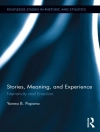This book provides an in-depth examination of minority language maintenance and loss within a group of first-generation Spanish-speaking families in the early-21st century, post-industrial, hyper-globalized US Midwest, an area that has a recent history of Latino settlement and has a low ethnolinguistic vitality for Spanish. It looks specifically at language ‘in the small spaces’, that is, everyday interactions within households and families, and gives a detailed account of the gendered nature of linguistic transmission in immigrant households, as well as offering insights into the sociolinguistic aspects of language contact dynamics. Starting with the question of why speakers choose to use and transmit their family language in communities with few opportunities to use it, this book presents the reader with a theoretical model of language maintenance in low vitality settings. It incorporates mothers’ voices and perspectives on mothering, their families’ well-being, and their role in cultural/linguistic transmission and compares the self-perceptions, motivations, attitudes and language acquisition histories of members of two generations within the same household. It will appeal to researchers and educators interested in bilingualism, language maintenance and family language dynamics as well as to those working in the areas of education, immigration and sociology.
表中的内容
Preface: Language Planning in Intimate Household Settings
Chapter 1. Language Maintenance and Loss in Low Vitality Settings
Chapter 2. Latino Language Experience in the US Midwest
Chapter 3. Language in the Small Spaces: Description of This Project
Chapter 4. Household Language Practices and Parental Strategies for Maintenance
Chapter 5. Mother and Children’s Attitudes and Motivations to Use Spanish
Chapter 6. Mothers and Children: Reported Proficiency
Chapter 7. Children: Observed Skills in Spanish
Chapter 8. Analysis of Children’s Story-Telling Task in Spanish and English
Chapter 9. Towards A Theoretical Model of Language Maintenance in Low Vitality Settings
Chapter 10. Conclusion
Appendices
References
Index
关于作者
Isabel Velázquez is Associate Professor in the Department of Modern Languages and Literatures at the University of Nebraska-Lincoln, USA. Her research interests include bilingualism, sociolinguistics and heritage languages, with a particular focus on Spanish in the United States.












